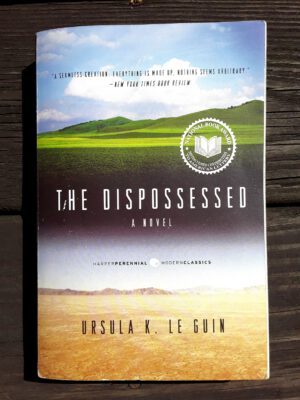How does the shown object point to a better world?
Ever since I can remember, I found — way before the Internet and smartphones — in books the world’s variety and pointers to other lives and possible better lives which I needed in the narrow small-town environment in which I grew up like air for breathing and becoming.
In the meantime, books have been materially devalued so much that they can be passed on in small ‘free libraries’ which I regard, at the same time, as lovely small sprouts of an ‘economy of free sharing’ – though I still keep some special treasures, which I would like to touch and read again, for the time being. That is also, things can get meanings which cannot be measured by money.
This special book which I first read in a German translation (title: Der Planet der Habenichtse) represents even more to me: In my early twenties, I had read a lot of science fiction and fantasy which I see in retrospect as a kind of training in the ’sense of possibilities’, a phrase which Robert Musil (in: ‘The Man Without Qualities’) coined for me, meaning: we need not only the sense of reality, but also the sense of possibilities. This book and this thought have planted in me the conviction that a better world will never be finished, let alone can be designed in a final way. Sense of possibilities — that is, the basic assumption and imagination in which things could still be different and better (instead of clinging to the status quo for fear of change) — is, thus, for me an essential component of a better world.
This is how I imagine a better world:
In contours:
No exploitation — neither of other people’s labor nor of nature. Instead, cooperation between peers as well as sustainability and respect for other beings (which excludes discrimination against anyone already); and loving care for all who need it: children and the elderly, people in mourning or with other special needs; sick animals, thirsty plants, our wondrously alive little planet in the big universe…
Examination of the world in all forms of art at eye level with and in productive exchange with scientifically guided research as well as civic engagement and lively, constructive debates at eye level about what, how and where is not going so well or could go even better.
No violence as ostensible means of ’solving’ conflicts — although I confess that I kill ants in my kitchen as well as annoying flies and mosquitoes when I can get them. Alas, yes, there is always still something left to work on…
In imaging an utopian life for myself, Marx did once inspire me: Going fishing in the morning or working in the garden or supporting my sick neighbor; cooking and enjoying dinner with loved ones and/or guests in the evening, laughing and ‘philosophizing’, e.g. thinking and discussing about possibilities for a better life, or watching a new film or going to the theater in the neighborhood; and in between working in my cooperative or on a new public mosaic or or … while my existential needs would be taken care of as much as those of everyone else.
This text was translated by machine. See original text.


